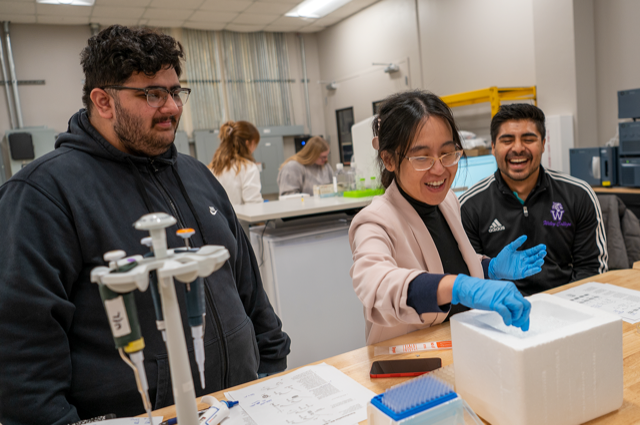LSU Shreveport Biology Faculty, Students Researching Cancer Cure
February 23, 2023
LSUS students are participating in interdepartmental research to improve plant-based cancer therapies
SHREVEPORT - The LSU Shreveport Cyber Collaboratory’s name insinuates the use of 3D printers and hologram tables, but a biology professor and her students are utilizing the space to discover better therapeutics for cancer.

LSU Shreveport's Dr. Vonny Salim works with graduate students to research and improve plant-based cancer therapies.
– LSU Shreveport
Since 2008, Dr. Vonny Salim has been studying plant-based medicine as a means of treating cancer. It all began with a childhood curiosity.
“When I was little and would get a cough, my mom would give me garlic instead of something from the drugstore. My curiosity grew as I moved along in my undergraduate studies in biochemistry and biotechnology. How else could nature inspire us to make better drugs for healing ailments?” Dr. Salim said.
By using genomic and biochemical approaches, Dr. Salim seeks to reveal diverse pathways in medicinal plants to produce anticancer compounds that can be used in chemotherapy. Dr. Salim has received research funding from the Louisiana Biomedical Research Network, or LBRN, to pursue these goals. Her primary focus is to diversify plant natural products by characterizing the molecular components in plants that could be modulated for genetic engineering, therefore improving existing cancer drugs and tailoring them to be better suited for cancer treatment.
“In biotechnology, we have a plethora of tools to manipulate proteins involved in the production of such anticancer compounds,” said Dr. Salim. “In our lab, we clone the plant genes and express them in a microbial system for enhanced yield and novel metabolites.”
As she continues her research, Dr. Salim collaborates with colleagues from LSUS and LSU Health Shreveport. Her mentor for this project is Dr. Shile Huang from the Department of Biochemistry at LSUHS, who focuses on testing the anticancer compounds. Salim also involves her students with her research, a practice she finds enhances the material they are learning in class.
“They gain more knowledge by having a hands-on experience they don’t necessarily gain through classroom learning. They also work with others in the lab and learn how to solve problems together,” Dr. Salim said.
Involving her students gives them a sense of ownership of the work and teaches them the expectations of a real lab. “When students work in the lab, they are presented with a problem and a chance to explore it. This supports lifelong learning. They are learning the value of staying curious!”
Dr. Salim and her students also work with the Computer Science Department at LSU Shreveport to make cancer research more efficient. Dr. Urska Cvek, a professor in the LSUS Computer Science Department, met Salim when she joined the university in 2018. Dr. Cvek also serves as the Associate Director of the Bioinformatics, Biostatistics, and Computational Biology Core, or BBCC, with the LBRN, and she took an interest in Dr. Salim’s research and found a way the Computer Science department could contribute. Together with Dr. Marjan Trutschl, Cvek operates the Laboratory for Advanced Bioinformatics at LSU Shreveport, or LABi. There, undergraduate and graduate students earn valuable experience they can apply to their post-graduate careers. With the help of computers, the faculty and students involved with LABi can organize, manage, and analyze biological data in the interest of improving medical approaches, assisting with diagnostic techniques, or perform epidemiological studies that guide patient recommendations.
“We have much to learn from each other when we work with collaborators from other disciplines, and I strongly believe we enrich the work of each other in the process,” Dr. Cvek said.
Dr. Salim is also collaborating with Jason Mackowiak, Chair of the Department of Arts and Media, to utilize graphic design and visualization in scientific teaching. Her molecular biology students get an opportunity to work with the students in the Digital Arts department to analyze three-dimensional structure of proteins and display their holographic images in the Cyber Collaboratory. Holographic visualization allows deeper learning on structure-function relationships to explain biological processes at the molecular level.
At LSU Shreveport, students take an active role in their education. They have a chance to participate in research opportunities like making the cure for cancer more accessible and cost-effective for patients, and they gain a unique, foundational experience that paves a path towards success.


